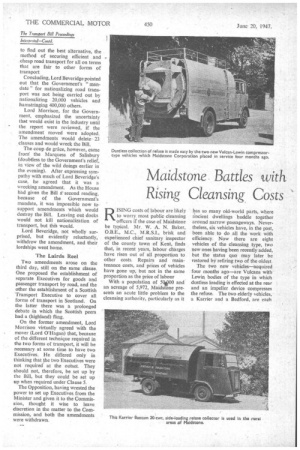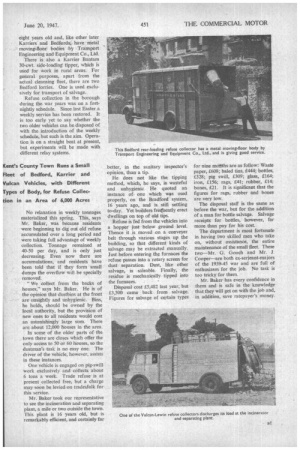Maidstone Battles with Rising Cleansing Costs
Page 34

Page 35

If you've noticed an error in this article please click here to report it so we can fix it.
Kent's County Town Runs a Small Fleet of Bedford, Karrier and Vulcan Vehicles, with Different Types of Body, for Refuse Collection in an Area of 6,000 Acres to find out the best alternative, the method of securing efficient and cheap road transport for all on terms that are fair to other forms of transport Concluding, Lord Beveridge pointed out that the Government's "mandate " for nationalizing road transport was not being carried out by nationalizing 20,000 vehicles and hamstringing 400,000 others.
Lord Morrison, for the Government, emphasized the uncertainty that would exist in the industry until the report were reviewed, if the amendment moved were adopted. The amendments would delete 23 clauses and would wreck the Bill.
The coup de grace, however, came from' the Marquess of Salisbury (doubtless to the Government's relief, in view of the wild doings earlier in the evening). After expressing sympathy with much of Lord Beveridge's ease, he agreed that it was a wrecking amendment. As the House had given the Bill a second reading, because of the Government's mandate, it was impossible now to support amendments which would destroy the Bill. Leaving out docks would not kill nationalization of transport, but this would.
Lord Beveridge, not wholly surprised, but evidently reluctantly, withdrew the amendment, and their lordships went home.
The Lairds Reel Two amendments arose on the third day, still on the same clause. One proposed the establishment of separate Executives for goods and passenger transport by road, and the other the establishment of a Scottish Transport Executive to cover all forms of transport in Scotland. On the latter there was a prolonged debate in which the Scottish peers had a (highland) fling.
On the former amendment, Lord Morrison virtually agreed with the mover (Lord O'Hagan) that, because of the different technique required in the two forms of transport, it will be necessary at some time to have two Executives. He differed only in thinking that the two Executives were not required at the outset. They should not, therefore, be set up by the Bill, but they could be set up up when required under Clause 5.
The Opposition, having wrested the power to set up Executives from the Minister and given it to the Commission, thought it wise to leave discretion in the matter to the Commission, and both the amendments were withdrawn.
RISING costs of labour are likely to worry most public cleansing officers if the case of Maidstone be typical. Mr. W. A. N. Baker, 0.B.E., M.C., M.R.S.I., brisk and experienced chief sanitary inspector of the county town of Kent, finds that, in recent years, labour charges have risen out of all proportion to other costs. Repairs and maintenance costs, and prices of vehicles have gone up, but not in the same proportion as the price of labour
With a population of 5W00 and an acreage of 5,972, Maidstone presents an acute little problem to the cleansing authority, particularly as it has so many old-world parts, where ancient dwellings huddle together around narrow passageways. Nevertheless, six vehicles have, in the past, been able to do all the work with efficiency. Now there are eight vehicles of the cleansing type, two new ones having been recently added, but the status quo may later be restored by refiring two of the oldest.
The two new vehicles—acquired four months ago—are Vulcans with Lewin bodies of the type in which dustless loading is effected at the rear and an impeller device compresses the refuse. The two elderly vehicles, a Karrier and a Bedford, are each
eight years old and, like other later Karriers. and Bedfords, have metal moving-floor bodies by Transport Engineering and Equipment Co., Ltd.
There is also a Karrier Bantam 30-cwt. side-loading tipper, which is used for work in rural areas. For general purposes, apart from the actual cleansing fleet, there are two Bedford lorries. One is used exclusively for transport of salvage.
Refuse collection in the borough during the war years was on a fortnightly schedule. Since last Easter a weekly service has been restored. It is too early yet to say whether the two older vehicles can be disposed of with the introduction of the weekly schedule, but such is the aim. Operation is on a straight beat at present, but experiments will be made with different relay systems.
No relaxation in weekly tonnages materialized this spring. This, says Mr. Baker, was because residents were beginning to dig out old refuse accumulated over a long period and were taking full advantage of weekly collection. Tonnage remained at 40-50 per day, and is only just decreasing. Even now there are accumulations, and residents have been told that if they form small dumps the overflow will be specially removed.
"We collect from the backs of houses," says Mr. Baker. He is of the opinion that dustbins at the front are unsightly and unhygienic. Bins, he holds, should be owned by the local authority, but the provision of new ones to all residents would cost an astonishingly large surn. There arc about 12,000 houses in the area.
In some of the older parts of the town there are closes which offer the only access to 50 or 60 houses, so the dustman's task is no easy one. The driver of the vehicle, however, assists in these instances.
One vehicle is engaged on pig-swill work exclusively and collects about 6 tons a week. Trade refuse is at present collected free, but a charge may soon be levied on tradesfolk for this service.
Mr. Baker took our representative to see the incineration and separating plant, a mite or two outside the town.
This plant is 16 years old, but is remarkably efficient, and certainly far better, in the sanitary inspector's opinion, than a tip.
He does not like the tipping method, which, he says, is wasteful and unhygienic He quoted an instance of one which was used properly, on the Bradford system, 16 years ago, and is still settling to-day. Yet builders frecruently erect dwellings on top of old tips.
Refuse is fed from the vehicles into a hopper just below ground level. Thence it is moved on a conveyer belt through various stages up the building, so that different kinds of salvage may be extracted manually. Just before entering the furnaces the refuse passes into a rotary screen for dust separation. Dust, like other salvage, is saleable. Finally, the residue is mechanically tipped into the furnaces.
Disposal cost £5,482 last year, but £3,500 came back from salvage. Figures for salvage of certain types for nine months are as follow: Waste paper, £608; baled tins, £444; bottles, £328; pig swill, £309; glass, £164; iron, £156; rags, £41; rubber, £14; bones, £21. It is significant that the figures for rags, rubber and hones are very low.
The disposal staff is the same as before the war, but for the addition of a man for bottle salvage. Salvage receipts for bottles, however, far more than pay for his cost.
The department is most fortunate in having two skilled men who take on, without assistance, the entire maintenance of the small fleet. These two—Mr. G. Gooch and Mr. J. Cooper—are both ex-serjeant-majors of the 1939-45 war and are full of enthusiasm for the job. No task is too tricky for them.
Mr. Baker has every confidence in them and is safe in the knowledge that they will get on with the job and, in addition, save ratepayer's money.












































































